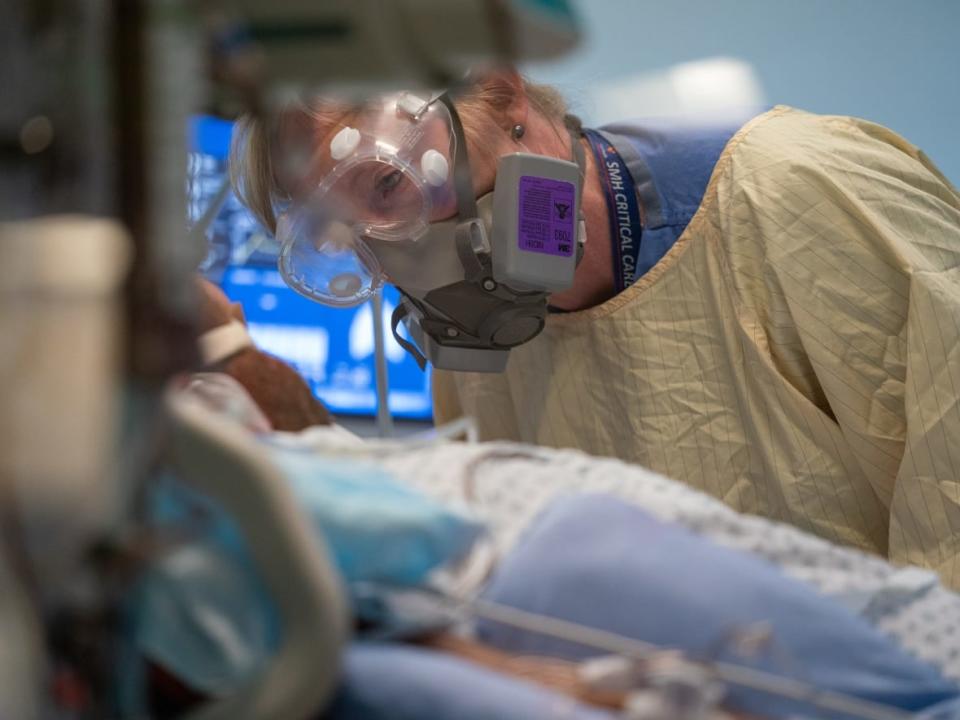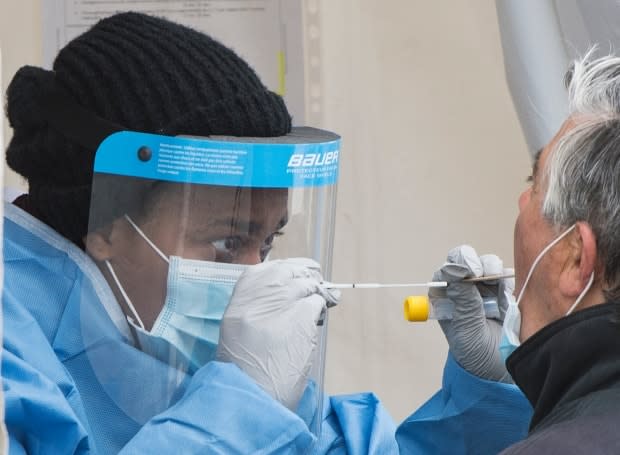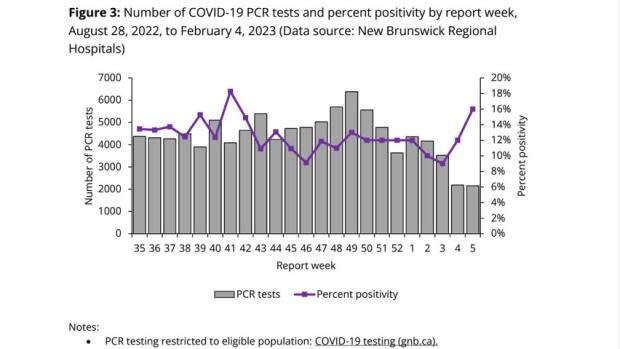N.B. adds 31 deaths to COVID-19 toll, most dating before last August

New Brunswick reported 31 more deaths from COVID-19 on Tuesday, raising the pandemic death toll to 812.
None of the new deaths occurred during the reporting week in question, Jan. 29 to Feb. 4, according to the COVIDWatch report. Six occurred between November and earlier in January. The other 25 occurred prior to Aug. 28.
"As noted previously, there's typically a lag in reporting, as Public Health relies on [Service New Brunswick's] Vital Statistics for notifications of deaths," the report states.
"Due to the intricacies of the reporting process, which requires medical practitioners and funeral directors to file paperwork, the lag can sometimes be longer than usual."
The average lag from date of death to the registration of death is two months, the province has previously said.
Of the six latest deaths, two people were aged 50 to 69 and four were 70 or older.
No information about the other 25 people is provided. Under format changes introduced in December, the COVIDWatch report only includes data dating back to Aug. 28, the start of the current respiratory season.
CBC News requested age breakdowns from the Department of Health.
"I can tell you that all of the deaths involved adults," spokesperson Adam Bowie said in an email.
Hospital admissions decrease, proportion of XBB doubles
The number of people admitted to hospital because of the virus has decreased compared to the previous week, while the number of lab-confirmed cases has increased, "following a period of general decrease," the COVIDWatch report says.
The proportion of cases identified as XBB, an offshoot of the Omicron BA.2 subvariant, has more than doubled in the past week to 21 per cent.
The report does not indicate how many of them are the subvariant XBB.1.5, which the World Health Organization has described as "the most transmissible" subvariant yet. But Bowie confirmed to CBC there were 23, raising the total since XBB.1.5 was first detected in the province last month to 42.
Dr. Jennifer Russell, the province's chief medical officer of health, was unavailable for an interview Tuesday, Bowie said.
Nine people were newly admitted to hospital because of COVID, down from 12 in the previous report. None are in intensive care, down from one.
The province no longer provides the number of people currently hospitalized because of COVID under the changed format.
The two regional health authorities say there are 50 New Brunswickers hospitalized for or with COVID as of Saturday, down from 63 the previous week. Five people require intensive care, down from nine.

A total of 339 new cases of COVID have been confirmed through a PCR (polymerase chain reaction) lab test, up from 265 — a nearly 28 per cent increase despite roughly the same number of tests being conducted — 2,154, compared to 2,188. That puts the positivity rate at nearly 16 per cent, up from about 12 per cent.
An additional 133 people self-reported testing positive for COVID on a rapid test, down from 145 a week ago.
The Moncton region, Zone 1, remains the hotspot for lab-confirmed cases, with 86, followed by the Fredericton region, Zone 3, with 70.
The regional breakdown of the remainder of the cases includes:
Saint John region, Zone 2 — 49.
Edmundston region, Zone 4 — 18.
Campbellton region, Zone 5 — 32.
Bathurst region, Zone 6 — 67.
Miramichi region, Zone 7 — 17.

Of the 109 most recent random samples sent for genetic sequencing, 73 per cent were the Omicron subvariant BA.5, 21 per cent were XBB, and six per cent were BA.2.
"It's important to note there may be a one-week lag in receiving sequencing results for reported cases," said Bowie, the Health Department spokesperson.
The department reports 1,002 COVID-19 vaccine doses have been administered in the past week, including 689 second boosters.
A total of 29.9 per cent of eligible New Brunswickers have now received their second booster, up from 29.6 per cent.
The other vaccination rates all remain unchanged from last week's report:
First dose — 90.9 per cent of eligible New Brunswickers.
Second dose — 85.8 per cent of eligible New Brunswickers.
First booster — 54.6 per cent of eligible New Brunswickers.
Horizon and Vitalité hospitalizations
Horizon Health Network has 42 active COVID-19 patients as of Saturday, four of whom require intensive care, according to its COVID dashboard, updated Tuesday. That's down from 57 and six respectively a week ago.
The Moncton region, Zone 1, has nine patients, the Saint John region, Zone 2, has 17, the Fredericton region, Zone 3, has 14, and the Miramichi region, Zone 7, has the other two.
Vitalité Health Network has eight hospitalized COVID patients as of Saturday, up from six in the previous report, its COVID dashboard shows. One person requires intensive care, down from three.
Four of the patients are at the Dr. Georges-L.-Dumont hospital in Moncton, Zone 1, including one in intensive care, one is at the Edmundston Regional Hospital in Zone 4, and in Zone 6, there are two patients at the Tracadie Hospital and one at the Chaleur Regional Hospital in Bathurst.
Nearly 27% increase in infected health-care workers
More health-care workers were off the job after testing positive for COVID-19 — 80, compared to 63 a week ago.
Horizon has 55 of the infected employees (up from 42), while Vitalité has 25 (up from 21).
Horizon has eight COVID outbreaks on hospital units, one less than in the previous report. They include four in the Moncton region, three in the Saint John region and one in the Fredericton region. No other details are provided.
Vitalité has not yet updated its outbreak page. It still lists one outbreak at the Restigouche Hospital Centre's community transition unit (B-2), as of Jan. 30.

